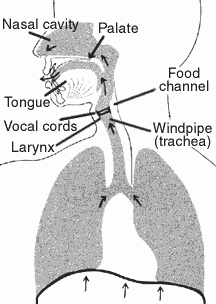It’s important to have a voice; it’s more important to use it well and with respect
Your voice is your calling card. It represents you when you’re present…and even when you’re not (eg. by way of voice mail, video, other recordings). Your voice either reinforces your message or stands in the way of putting your point across. How many people actually contemplate their own voice?
“Every bird loves its own song”, so the old saying goes, yet I suspect that (beyond those who make their living with their voice), few pay close attention to the quality of the sound coming out of their mouth–elements such as richness, timber, resonance. etc. You may be very self-assured at work about the content of your presentation, or how you represent yourself in an interview, or how you put your points across in a team meeting (or, in private life, about the affection you express for another), yet many would never know by the sound of it!
Are you certain that what you think you’re putting across with your voice is what your receiver is actually hearing? It’s true that there’s only so much you can do to maximize your voice quality (after all, we all have to work within the parameters of what “God gave us”, and, as classic author Henrik Ibsen reminds us, “Each bird must sing with his own throat”), but most of us could probably do better if we really wanted to “put our money where our mouths are”!
Consider these factors when working on your voice:
- Stress: heightened stress will contract your muscles and cause your body to perform poorly–throat and voice included.
- Breathing: when stressed, breathing becomes shallow and, among other impacts, effects the quality of the sound of your voice; it doesn’t help, either, if you are “breathing challenged” while suffering with a cold or seasonal allergies!
 Volume: the quality of your voice will alter–become thinner, more strained, raw and scratchy, the louder and longer you must project.
Volume: the quality of your voice will alter–become thinner, more strained, raw and scratchy, the louder and longer you must project.- Pitch: everyone comes wired with their own natural pitch–your natural and desired tone of voice. The most effective and captivating of employees/speakers (whether in a team meeting or a presenting at the company staff off-site) either intuitively or purposefully know the importance of mixing up the tone to create “melody” in any given statement.
- Articulation: the clarity and precision with which you team up your lips, tongue and teeth makes either a “beautiful noise”–one that is clearly understood by all–or, sadly, a regretful and irritating sound. Fairly or unfairly, your pronouncement of words, eg. articulating your “ing’s” and “t”s, etc., leaves a distinct impression about your professional personality qualities and traits. Articulation can be that magic ingredient that causes others to move towards you in interest, or away from you in judgement.
- Resonance: once you have created and released vocal sounds from your larynx, the throat, mouth and nose will create the reverberation centres for your personal voice resonance. Any tension you may be holding in your face, eg. lips, cheeks, tongue or throat, will impact the richness of your voice resonance.
- Rate of Speech: The speed with which you put your sentences across will not only effect the quality of the sound coming out of your mouth, but may also effect the accuracy of what is heard by the other. Often times those who are stressed when speaking–or just plain too much in a hurry to “get it over with”– don’t realize how speeding things up may leave their listeners in a metaphoric whirlwind of bewilderment and, sometimes, make those listeners a bit nervous, too! As Seinfeld (Jerry and all) would say…these people are quintessential examples of the “fast talker”.
- Pauses and Intonation: Sometimes, especially when under stress, pauses in speech seem to go out the door. Not only do pauses in your statements add to the over all melody and intonation of your message, they allow time for your larynx to relax and get ready for another sprint (pauses allow time for you to take another breath, to enhance over all sound). As I have previously mentioned in other issues of “Working Wisdom”, my piano teacher would constantly remind me that “rests (or pauses, if you will) are part of the music!” Indeed they are.
So that’s that for factors effecting voice quality. Now the question is, “What to do, what to do, what to do?
Try the following:
- Get Proper Sleep: Your body needs its rest to perform well, both physically and emotionally, on any given day. It’s the same with your voice. “Morning voice” (like morning hair) can be a bit rough. It worsens, however, if you’ve only taken four or five hours of sleep. And that scratchy quality may persist far into your workday. Realize that getting proper sleep–especially before any “big day”–is as good for your voice as it is for clear, sharp thinking.
 Drink, drink drink…water, that is: Keep yourself hydrated at all times. Don’t wait until you’re thirsty (by then you’re already dehydrated!). If you can stand it, drink room temperature (or warmer) water to relax your throat, as cold water constricts muscles and weakens sound quality. Remember, as well, to lay off the caffeinated beverages if you want your voice to sound its best. Also, antihistamines and other over-the-counter cold and flu medicines, while alleviating what ails you, suck the hydration from your system and can also undermine the quality of your voice.
Drink, drink drink…water, that is: Keep yourself hydrated at all times. Don’t wait until you’re thirsty (by then you’re already dehydrated!). If you can stand it, drink room temperature (or warmer) water to relax your throat, as cold water constricts muscles and weakens sound quality. Remember, as well, to lay off the caffeinated beverages if you want your voice to sound its best. Also, antihistamines and other over-the-counter cold and flu medicines, while alleviating what ails you, suck the hydration from your system and can also undermine the quality of your voice.- Reduce your “Hollering Factor”: Do you yell across the room, down the hall or up the stairs, rather than get up and actually walk over to the other to ask your question or share information? I do. At least some of the time, I confess. It’s not good for your voice (nor for your over all fitness level). Or are you one of those who speak at an unnaturally loud volume when on the phone or in a meeting? Another unnecessary strain to the voice. Tone it down when you can, or get up and deliver your message or question in a face-to-face manner, instead–much more gracious and civilized, too.
- Forget office whisperings: Believe it or not, whispering, too, is damaging to your voice! It is an unnatural forcing. If you don’t believe me, just try–right now–reading these sentences aloud, in a loud and forced whispering tone, paying attention to the tension you feel in your throat and tongue. See?
 Shut-up: Gregarious, outgoing people love to talk and are very friendly, indeed (ask any professional speaker!). The trouble is, if you must count on your voice to represent yourself and your message in the most impressive and favourable way, you may have spent the best part of your voice before you’ve even started! I’ve heard that Canadian singer Celine Dion actually practices a full day of total silence before each full scale concert (perhaps all singers do this, including opera stars?). Refusing to say a peep for a full day before a presentation or meeting may be a little bit over-the-top and “prima donna” ish for us “regular folk” (and it may be difficult to explain to your customers or boss, too), but deciding to build in at least two or three quiet periods in your day will definitely help rest your voice and strengthen the probability of a richer voice quality the following day.
Shut-up: Gregarious, outgoing people love to talk and are very friendly, indeed (ask any professional speaker!). The trouble is, if you must count on your voice to represent yourself and your message in the most impressive and favourable way, you may have spent the best part of your voice before you’ve even started! I’ve heard that Canadian singer Celine Dion actually practices a full day of total silence before each full scale concert (perhaps all singers do this, including opera stars?). Refusing to say a peep for a full day before a presentation or meeting may be a little bit over-the-top and “prima donna” ish for us “regular folk” (and it may be difficult to explain to your customers or boss, too), but deciding to build in at least two or three quiet periods in your day will definitely help rest your voice and strengthen the probability of a richer voice quality the following day.- Sit up: (no, this is not your mother talking!) Rounded shoulders, with chin squished into your sternum, and a general upper body slump, creates a horrible voice sound. When you sit in such a shrunken state your lungs are compressed and you’re probably taking in about 30% of the oxygen you should. Less oxygen equals more fatigue and stress, and less energy, too. Experiment with this, if you like: record your daily voice mail in the state described above. Play it back to verify voice quality and general energy transmitted in your greeting. Now, redo that message sitting straight, with your chin properly lifted off your chest, shoulders back. Do you hear the difference? You may even hear a greater difference, still, if you try this test standing up.
The human voice is the organ of the soul.
Henry Wadsworth Longfellow
There is no index so sure as the voice.
Tancred
Lower your voice and strengthen your argument.
Lebanese Proverb
A man’s style is his mind’s voice. Wooden minds, wooden voices.
Ralph Waldo Emerson
He ceased: but left so charming on their ear His voice, that listening still they seemed to hear.
Homer, The Odyssey
The devil hath not, in all his quiver’s choice, An arrow for the heart like a sweet voice.
Lord Byron (George Gordon Noel Byron), Don Juan
Oh, there is something in that voice that reaches The innermost recesses of my spirit!
Henry Wadsworth Longfellow, Christus
In addition to all of the above, notice if you have any subtle irritated throat reactions to nuts, dairy products and fumes from household cleansers. As well, if you’re a snorer (I know, I know…you can’t help it–you’re getting that rest I suggested!) see what you can do about that, too, eg. naturally humidify your sleeping quarters by keeping the window open, or keeping a pan of water on the floor for moisture, sleep on your side, experiment with the numbers of pillows you use. And of course, the biggest “no brainer” of all…work hard on minimizing your stress! Stress is at the crux of so much of what ails us at work. Who would have thought that it could effect our voices, too? If you want to be a “sweet talkin guy” or a a “smooth talkin girl” (and remember to articulate those “g”s!)…Bring your voice to life…and work. If you don’t use it, you lose it!











